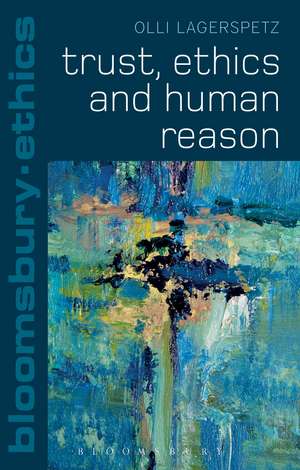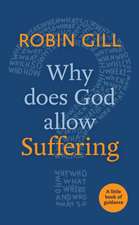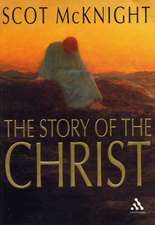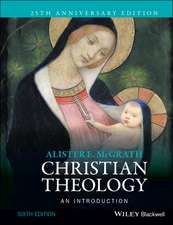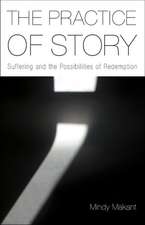Trust, Ethics and Human Reason: Bloomsbury Ethics
Autor Dr Olli Lagerspetzen Limba Engleză Paperback – 18 noi 2015
| Toate formatele și edițiile | Preț | Express |
|---|---|---|
| Paperback (1) | 220.75 lei 6-8 săpt. | |
| Bloomsbury Publishing – 18 noi 2015 | 220.75 lei 6-8 săpt. | |
| Hardback (1) | 771.75 lei 6-8 săpt. | |
| Bloomsbury Publishing – 18 noi 2015 | 771.75 lei 6-8 săpt. |
Preț: 220.75 lei
Preț vechi: 246.35 lei
-10% Nou
Puncte Express: 331
Preț estimativ în valută:
42.25€ • 43.64$ • 35.16£
42.25€ • 43.64$ • 35.16£
Carte tipărită la comandă
Livrare economică 25 martie-08 aprilie
Preluare comenzi: 021 569.72.76
Specificații
ISBN-13: 9781441184870
ISBN-10: 1441184872
Pagini: 224
Dimensiuni: 138 x 216 x 18 mm
Greutate: 0.5 kg
Editura: Bloomsbury Publishing
Colecția Bloomsbury Academic
Seria Bloomsbury Ethics
Locul publicării:London, United Kingdom
ISBN-10: 1441184872
Pagini: 224
Dimensiuni: 138 x 216 x 18 mm
Greutate: 0.5 kg
Editura: Bloomsbury Publishing
Colecția Bloomsbury Academic
Seria Bloomsbury Ethics
Locul publicării:London, United Kingdom
Caracteristici
Summarises a rapidly developing and multifaceted field of philosophical ethics for a student audience
Notă biografică
Olli Lagerspetz is Senior Lecturer in Philosophy at Åbo Academy, Finland.
Cuprins
Acknowledgements1 Trust and our worries with itTrust and reason: Friends or foes?On how to write about what trust 'is'The need for reflexivityCurrent issuesTrust and relianceNormative and non-normative conceptions of trustWhat happens next?2 Trust and Hobbesian reasonThe Hobbesian dilemmaTrust as risk managementA game-theoretic solutionCritique of game theory: The need for a socialframeworkTrustworthiness and encapsulated interestsIs this trust? - A caveatTrust and strategic reason, and where to go fromhereThe metaphysics of interests3 Vulnerability and entrustingBaier's ambiguous critique of rationalismThe theory of trust as entrustingEntrusting and simple trustFactual and ethical vulnerabilityThe notion of possibilityVulnerability revisitedA Novel from the 21st CenturyTrusting and being trusted4 The time dimensionMethodological timelessnessPrisoners' Dilemma revisitedTimelessness in non-formal treatments of trust Assessing probabilityTrust as an interpretative activityNormality in ongoing interactionMethodological timelessness and methodologicalindividualism5 'Trust' as an organizing toolIs trust a psychological state?The 'dys-appearance' of trustFirst- and third-person perspectivesThe need for challengeConclusion6 Communication, truthfulness, trustCommunication as manipulation and mindreadingThe testimony debateThe norm of truthfulnessLøgstrup: Trust in conversation'Image' vs real presenceThe place of 'trust' in different ideas oflanguage7 Basic trustTrust as a response to scepticismA self-deception theory of basic trustParanoia and scepticism'The substratum of all my enquiring and asserting'Meeting the other in trust: Weil and LøgstrupIdeas of basic trust in context8 ConclusionsNotesBibliographyIndex
Recenzii
A very welcome addition to the discussion of a topic that is increasingly recognized as crucial to an adequate understanding of agency, rationality and ethics. Lagerspetz offers a useful survey of philosophical views of the place and importance of trust in human life, while making his own distinctive and valuable contribution to the discussion. This is essential reading for all working in these and related areas.
There is much to like about this book. And I have not done it justice in this brief review. I've not touched on Lagerspetz's engagement with the epistemology of testimony, or mentioned his introduction of Wittgenstein, K. E. Løgstrup and Peter Winch into the trust debate.
There is much to like about this book. And I have not done it justice in this brief review. I've not touched on Lagerspetz's engagement with the epistemology of testimony, or mentioned his introduction of Wittgenstein, K. E. Løgstrup and Peter Winch into the trust debate.
